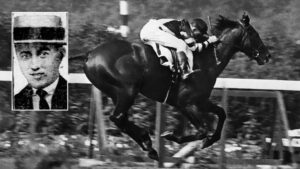COPYRIGHT © INHIST.COM / 2023
Mary Patten: The trailblazing captain commanded for 56 days against all odds
Mary Patten, born in Chelsea, Massachusetts in 1837, defied societal norms and made history as the first female commander of an American merchant vessel. Her remarkable journey began in 1856 when her husband, Captain Joshua Adams Patten, fell ill during a voyage, leaving Mary to take charge of the ship. Overcoming immense challenges and displaying unwavering determination, Mary Patten’s story is one of bravery, resilience, and a testament to the indomitable spirit of women.

Mary Patten’s early life and marriage

Mary Ann Brown, the daughter of George and Elizabeth Brown, was born and raised in Chelsea, Massachusetts. At the tender age of 16, she married Joshua Adams Patten, a young captain, on April 1, 1853, in Boston. Two years later, in 1855, Captain Patten was offered the command of a renowned clipper ship called Neptune’s Car. Reluctant to leave his wife for an extended period, Captain Patten sought permission for Mary to accompany him on the voyage. The ship’s owners granted their request, setting the stage for an extraordinary adventure.
Setting sail on Neptune’s Car

Neptune’s Car, a magnificent clipper ship renowned for its speed, had already established a reputation in 1855. Weighing 1,617 tons, with a length of 216 feet, the vessel was a marvel of maritime engineering. The New York Herald reported that Captain Patten, a last-minute replacement for the ship’s previous captain, embarked on the journey with Mary just twelve hours after receiving the offer. For the next 17 months, they sailed across the globe, from San Francisco to China, London, and finally back to New York. Throughout this voyage, Mary dedicated herself to learning navigation and supporting Captain Patten in his duties as the ship’s commander.
A crisis at sea
The fateful voyage took a dire turn when Neptune’s Car, along with two other clipper ships, set sail from New York to San Francisco on July 1, 1856. The race against time and fellow competitors heightened the importance of speed. Tragedy struck as Captain Patten fell into a coma due to tuberculosis while at the foot of Cape Horn. In normal circumstances, the first mate would assume command. However, Captain Patten had previously disciplined the first mate for negligence, leaving Mary as the most qualified individual to navigate the ship safely.
Husband’s collapse and attempted Mutiny
Realizing the gravity of the situation, Mary received a letter from the former first mate, urging her to reinstate him and warning of the challenges ahead. However, Mary firmly stood by her husband’s decision, as she believed that if he did not trust the first mate, she could not either. The first mate, motivated by personal interests, attempted to incite mutiny among the crew, suggesting they divert to Valparaiso instead of continuing to San Francisco.
Aware that such a detour would result in loss of crew and cargo, Mary appealed to the loyalty of the crew, ultimately gaining their unanimous support. Throughout this period, Mary’s dedication to her husband’s well-being was unwavering, as she studied medicine and cared for him despite his declining health.
Triumph and recognition
Despite the numerous challenges faced, Neptune’s Car managed to arrive in San Francisco ahead of one of its competitors, securing second place in the race. Mary’s exceptional leadership and navigation skills had played a pivotal role in their success. Recognizing her extraordinary efforts, the ship’s insurers rewarded Mary Patten with a sum of one thousand dollars in February 1857. In response to this gesture, she humbly stated that she was doing “only the plain duty of a wife.” Her heroism and resilience became widely known, and she earned fame for her remarkable accomplishments.
Return home and tragic loss
After completing the journey back to New York on the steamer George Law, Mary and Joshua Patten safely returned to Boston. On March 10, less than a month after their arrival, Mary gave birth to their son, Joshua. So, all these oddities were going on in her life while she was pregnant.
Sadly, Captain Joshua Patten passed away in July 1857. Mary Ann Brown Patten received financial support from a relief fund set up by the Boston Courier, amounting to $1,399. However, tragedy struck once more as Mary succumbed to tuberculosis four years later, on March 31, 1861, just before her 24th birthday. Both Mary and her husband found their final resting place at Woodlawn Cemetery in Everett, Massachusetts.
Legacy and inspiration
Mary Patten’s legacy as a trailblazing captain and a symbol of female empowerment lives on. Her remarkable achievements continue to inspire generations of women to challenge conventions and pursue their dreams. The story of Mary Patten serves as a powerful reminder that determination, resilience, and unwavering dedication to duty can overcome even the most formidable obstacles. Her remarkable journey, marked by bravery and sacrifice, will forever be etched in maritime history.
Final words
Mary Patten’s extraordinary tale of commanding Neptune’s Car during her husband’s illness is a testament to her strength, courage, and unwavering commitment. Against all odds, she navigated the ship for 56 days while pregnant, faced down a mutiny, and studied medicine to keep her husband alive.
Mary Patten’s heroics earned her fame and recognition, and she rightfully left an indelible mark on maritime history. Her story serves as a powerful reminder that women have always played a vital role in shaping the world, even in domains traditionally dominated by men. Mary Patten’s legacy continues to inspire and empower women to break barriers and pursue their dreams, leaving a lasting impact on future generations.



